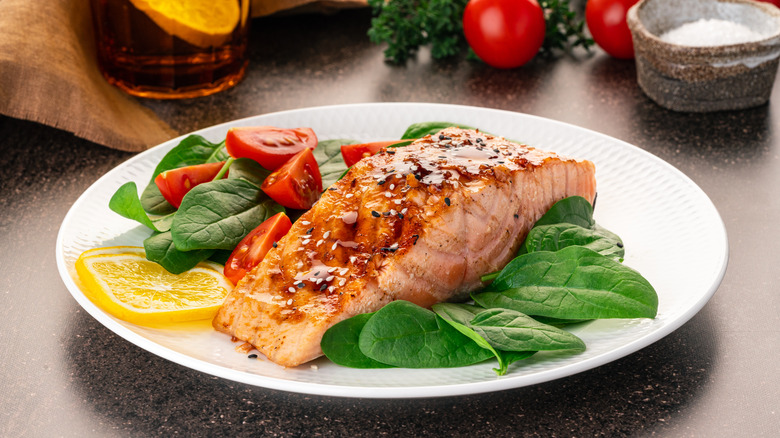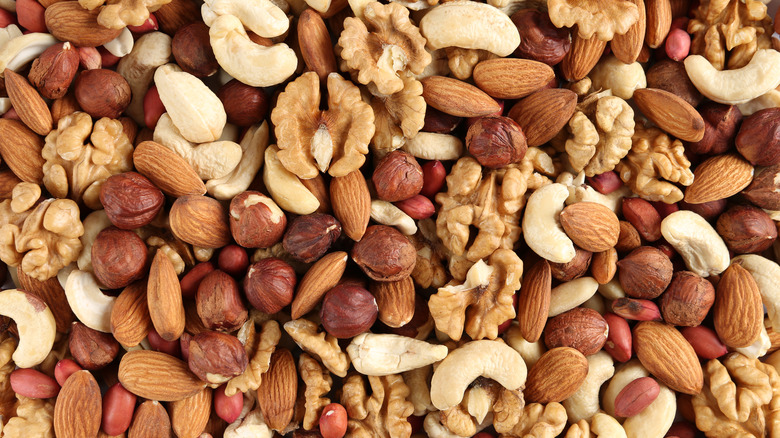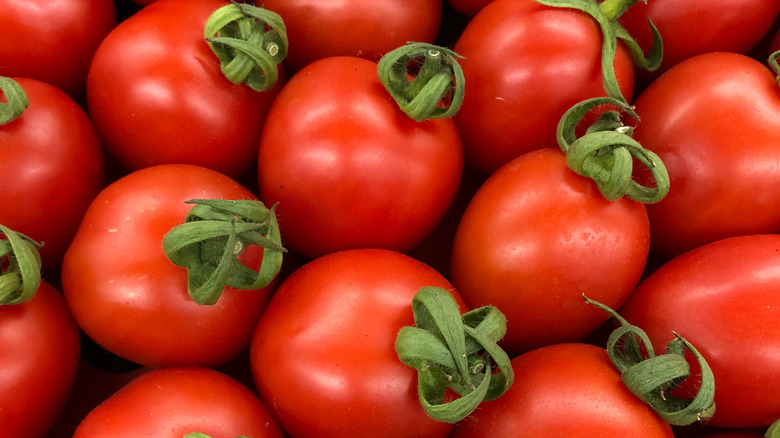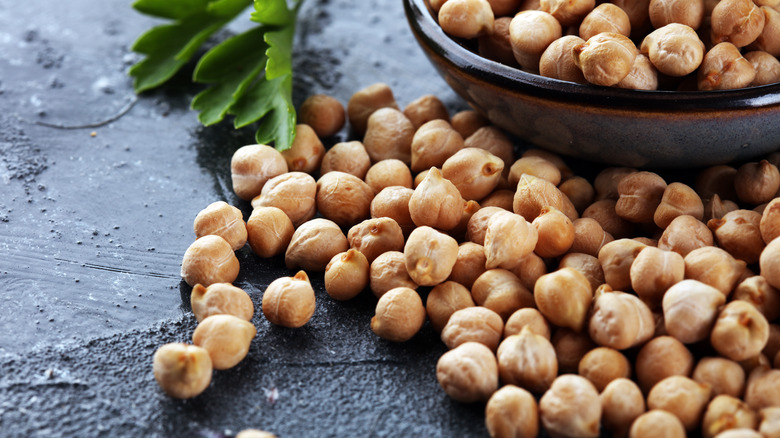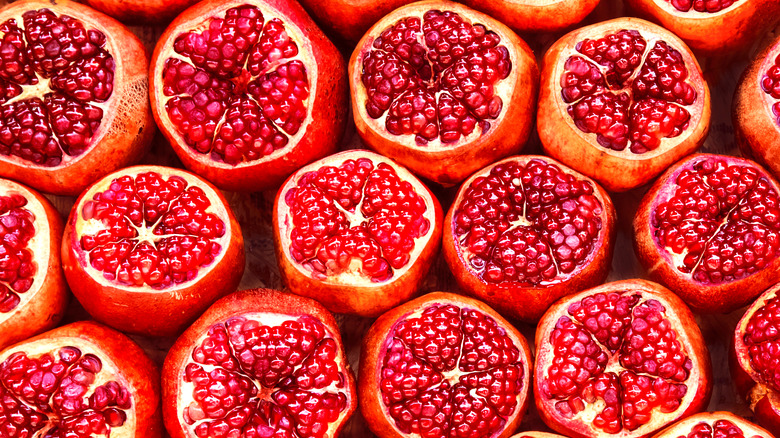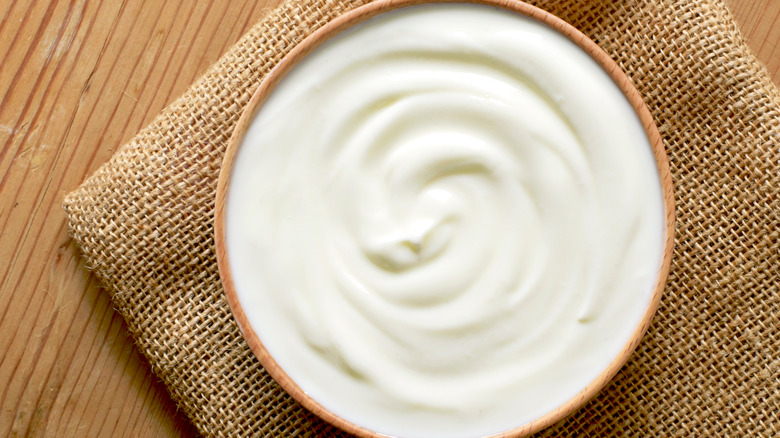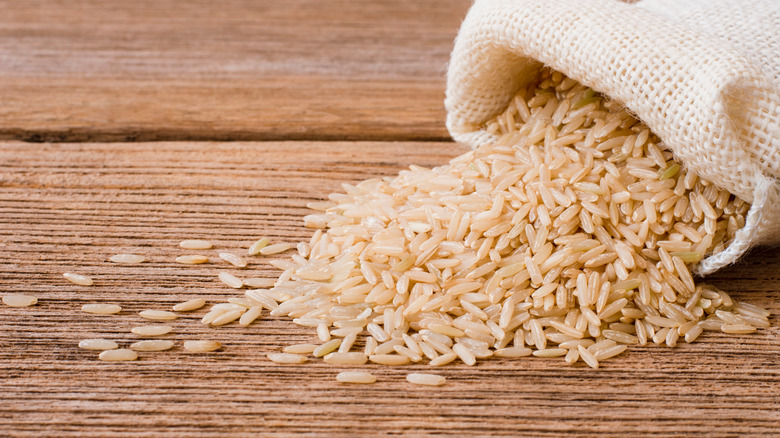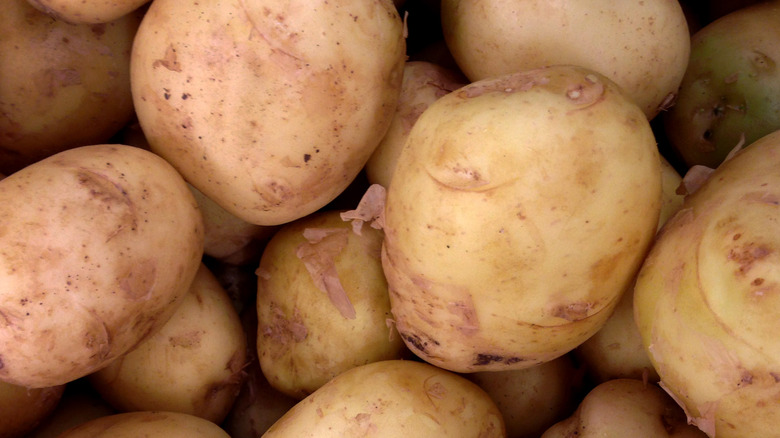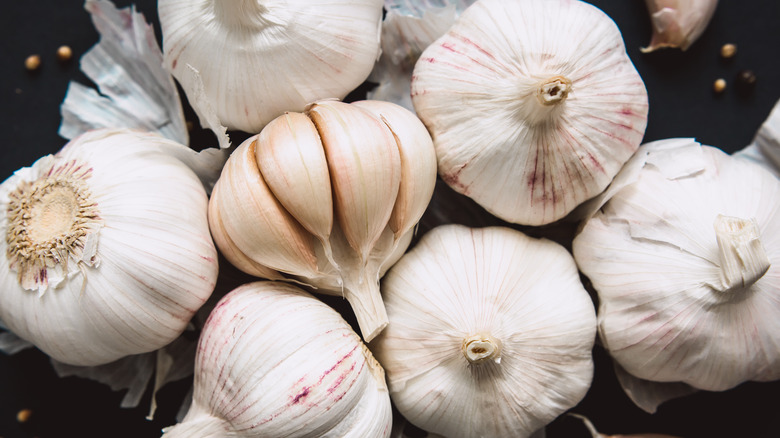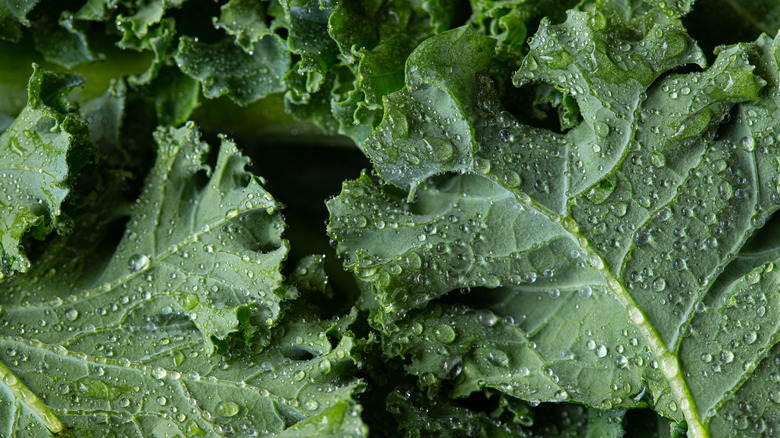Stick To These Foods If You're On The Mediterranean Diet
Fancy a diet where delicious fresh fish, olive oil, potatoes, and wine are still on the menu? Then the Mediterranean diet could be the one for you. Followed by millions of people worldwide simply by their natural proximity to the Mediterranean and the foods which thrive there, the diet is praised for its association with maintaining good cardiovascular health, according to the Mayo Clinic, as well as the extensive food choices on offer. "The Mediterranean diet is something where you're allowed a lot more than Atkins or keto and a lot of these other diets," says dietitian and author of "The Women's Health Big Book of Smoothies and Soups" Lisa DeFazio to Insider. "That's why it works for a lot of people. It has a good variety of foods, so people can pick what works for them."
But, it's important to remember that the effects of the Mediterranean diet are very much the sum of their parts. "There's no single aspect of the diet that keeps your heart healthy," as professor of nutrition at the Harvard School of Public Health Meir Stampfer says to Shape. As such, keep your Mediterranean diet both varied and healthy by sticking to these foods.
Salmon and other fatty fish are a great source of omega-3's
Fatty fish is a staple of the Mediterranean diet, and salmon rules supreme above them all. Salmon, as well as other fatty fish such as albacore tuna, mackerel, sardines, and herring, have a high proportion of omega-3 fatty acids, states the Mayo Clinic. These fatty acids are well-known to raise "good" HDL cholesterol levels, as well as helping to reduce and maintain healthy blood pressure, according to Healthline. Both of these help to contribute towards good heart health.
Salmon's benefits don't stop there. In addition to being a great source of protein, salmon is also high in vitamin A and vitamin D, proper intake of which registered dietitian nutritionist Keri Gans advises helps out with your eye health and keeping your immune system healthy (via Health). Salmon is also a great source of vitamins B3 and B12, which help to convert food into energy for your body and to stave off tiredness. The fatty fish is also a rich source of iron, zinc, and selenium, essential minerals that help your body function correctly and, in the case of selenium, help to regulate your thyroid hormone.
Certain nuts can help decrease the risk of heart disease
The Mediterranean diet places a strong emphasis on the consumption of healthy fats, and that's why nuts like walnuts, hazelnuts, and almonds are a firm fixture on the menu. Nuts contain a high proportion of healthy unsaturated fatty acids, which can support heart health by improving your artery lining's health and lowering the "bad" LDL cholesterol in your system, decreasing the risk of heart disease, says the Mayo Clinic.
The effectiveness of walnuts, hazelnuts, and almonds to support heart health as part of a Mediterranean diet has also been shown in scientific studies, such as a study published in the New England Journal of Medicine. The study looked at almost 7,500 participants who were at high cardiovascular risk and assigned some participants a Mediterranean diet containing nuts (walnuts, hazelnuts, and almonds) or olive oil, and others a low-fat diet. At the end of the study, it was found that the participants who were following the higher-fat Mediterranean diet with either nuts or olive oil had a lower proportion of major cardiovascular events than those who were following the low-fat diet.
Tomatoes can help prevent chronic disease
Dreaming of a marinara sauce? If you're following the Mediterranean diet, you're in luck. Tomatoes, abundant in Mediterranean settings, are a staple of the diet and are a super-healthy, super-delicious choice. "Tomatoes are low in calories, (about 25 calories per one medium-size tomato) yet filled with nutrition," says Pittsburgh-based nutritionist, dietitian, author, and Academy of Nutrition and Dietetics spokesperson Heather Mangieri to Live Science. "[They] are high in fiber and a good source of vitamin A, C, B2 ... folate and chromium." To add to their nutritional excellence, tomatoes contain lycopene and beta-carotene, two pigments that not only give tomatoes their bright red color but antioxidants "that are thought to play a role in chronic disease prevention," states Mangieri.
It's easy to fall back on just using tomatoes in sauce, but there are hundreds of recipes out there that let you enjoy the fresh fruit (or vegetable, depending on your perspective, per National Geographic) in its full glory. Try out a classic tomato and cucumber or Greek salad, or stuff your tomatoes with a mixture of grains, herbs, and meat, and then roast, as The Mediterranean Dish suggests. Or, just keep it simple, and roast them whole with a little olive oil, salt, and any herbs you have to hand.
Chickpeas, as well as other legumes, are a healthy staple
Ah, the chickpea. This noble legume is at the heart of so many Mediterranean dishes (and well-loved dishes around the world), and for good reason: chickpeas, as well as other legumes, are nutritional powerhouses that should be a centerpiece of your Mediterranean diet. As dietitian Rahaf Al Bochi, founder of nutrition consulting company Olive Tree Nutrition, says to CNBC News, chickpeas are high in both fiber and protein, a combination that makes them superb for maintaining bone, skin, and muscle health. A high-fiber diet can also help to protect your heart health, with dietary fiber helping to reduce blood pressure and inflammation and lowering your LDL levels, as the Mayo Clinic shows.
Chickpeas are also a great source of antioxidants, helping to fight free radicals in the body and prevent long-term illness, according to Medical News Today. The fiber in chickpeas is also instrumental in reducing inflammation in the body and helping to lower blood glucose levels, helping people with diabetes to manage their blood sugar and symptoms. And you can make hummus with them. In short, chickpeas rule.
Fruits like pomegranate are essential to the Mediterranean diet
In the ruby-red seeds of the pomegranate, goodness lies. Aside from being deeply delicious, pomegranates are hugely beneficial nutritionally and can be a great addition to any Mediterranean diet. "Pomegranates are high in fiber," says dietitian and certified diabetes care and education specialist Tejal Pathak to Eating Well. With a half-cup of pomegranate seeds containing 3.5 grams of fiber, that's almost a tenth of the amount an adult male is recommended to consume per day, and almost a seventh of the female recommended intake. Not bad for a snack you can eat on the go.
To add to this, "pomegranates are high in anthocyanins, which are strong antioxidants and also responsible for their beautiful ruby-red color," explains dietitian and nutrition educator Sarah Pflugradt. These antioxidants can be hugely beneficial for your heart health, as well as to lower your overall blood pressure. It can sometimes be a little confusing to figure out how to use pomegranate in dishes, but this orange and pomegranate salad from The Mediterranean Dish is a great place to start. Remember though, according to Healthline, an ideal Mediterranean diet would incorporate not only pomegranate, but a host of other fruit, as well. Each fruit has its nutritional benefits and, to make your diet as healthy as possible, you want to get as many as possible.
Zucchini is a versatile vegetable full of antioxidants
The zucchini is the unsung hero of the kitchen, and this versatile vegetable is not only usable in a variety of recipes, but is hugely nutritious. Zucchini has a high B6 content — a vitamin that can help to protect against diabetes and manage blood glucose levels, according to WebMD. The squash also contains levels of zeaxanthin and lutein, two powerful antioxidants which have particular benefits for your eye health, reduction of the risk of cataract development, and may help to reduce the risk of cancer.
It's hard to go wrong with using zucchini in a dish given that it goes with pretty much everything, but Mediterranean Living has a few top suggestions for where to start. Give their Traditional Cretan zucchini and onion omelet a go, topped with fresh Greek yogurt and served with a classic Greek salad on the side. To bring out the flavor of the zucchini, try a soup with basil and lemon; or, if you want to crank up the indulgence, try some zucchini fries. We're willing to bet you won't regret them.
You can't be on the Mediterranean diet without olive oil
A Mediterranean diet without olive oil is like a day without night — the two simply can't be separated. It's also almost impossible to know where to begin with the nutritional benefits of olive oil for your health. Olive oil, particularly extra-virgin olive oil (or EVOO) has well-known positive effects on heart health as part of a varied diet, helping to control blood pressure and reduce bad cholesterol, states nutritionist Nicola Shubrook for BBC Good Food. This has been shown in multiple studies, including a study published in The American Journal of Clinical Nutrition that showed the positive link between monounsaturated fats (like olive oil) and a lower risk of coronary heart disease.
Olive oil has also been observed to be beneficial in reducing the risk of depression when eaten as part of a healthy and varied diet (such as the Mediterranean diet), and may also help to improve cognitive function in later years and prevent the risk of age-related illnesses like Alzheimer's, as this study from JAMA shows. It could also help to reduce inflammation and protect against chronic disease. And the best part? It tastes very, very good.
Greek yogurt is a great source of protein on the Mediterranean diet
Greek food and cuisine have a huge influence on the Mediterranean diet, and Greek yogurt is a food you can't go without — not least for its nutritional benefits. "It's a great source of protein, providing about 14 grams of protein per 150-gram serving (that's the size of an average yogurt pot)," advises registered dietitian and founder of Carbon Nutrition Jasmine Carbon to GoodToKnow. Not only is this a quarter of the average man's recommended protein intake for the day (per SCL Health), but "this is about 40% more protein than in a serving of plain natural yogurt," says Carbon, a huge win for the Greek version.
This protein has an effect beyond simply being good for maintaining your bone and muscular health: it also has a sating effect. "We know that taking in adequate amounts of protein spaced out across the day can help to make you feel fuller and reduce hunger cravings," says Carbon. Protein takes much longer to digest than simple sugars, meaning our energy levels stay steady and our hunger fluctuates less, according to WebMD. As such, "if you have less hunger cravings," concludes Carbon, "there is less chance of you reaching for highly refined sugar and/or high fat convenience snacks."
Red wine is a natural addition to the Mediterranean diet
Yep. Red wine is not only allowed on the Mediterranean diet, but basically required (for those lucky folks who live in the Med, anyway). And, red wine's contribution, in moderate quantities, to both heart and general health has been well-observed. One study in particular, published in Critical Reviews in Food Science and Nutrition, stated that a diet pattern that followed the "Mediterranean way of drinking," with moderate wine consumption (up to two glasses per day for men, one glass per day for women) with food can reduce the risk of heart disease and increase longevity, while not influencing the overall risk of cancer.
While this study focused on all wine in relation to a Mediterranean diet, red wine is really where the good stuff is, particularly when it comes to wine's potential to reduce our levels of bad cholesterol. "Wine has the additional benefit of its natural phenolics, which help prevent the oxidization of LDL cholesterol. Red wine in particular is thought to be more effective in this," says sommelier and wine educator Aaron Berdofe to Today's Dietitian. It's important to note, however, that "the mechanisms behind it have yet to be fully proven," states Berdofe.
Whole grains are a great carb source on the Mediterranean diet
While the emphasis in the Mediterranean diet is often on fresh fish, olive oil and vegetables, whole grains play a hugely important part in it. Whole grains like brown rice and farro offer a healthy boost of complex carbohydrates and fiber, as well as (in the case of farro in particular) protein, says Everyday Health. These grains can help to reduce the risk of a range of diseases, including cardiovascular disease, type 2 diabetes, types of cancer like colorectal cancer, and stroke.
Brown rice is an especially nutritious whole grain, and supplies not only carbohydrates and fiber but is also rich in magnesium, phosphorus, and selenium, as Insider points out. It's also worth remembering that due to the processing that white rice undergoes, that it doesn't quite match up nutritionally to brown rice, and to try and limit this and other processed grains in favor of whole grains. White rice contains much less fiber, potassium, magnesium, phosphorus and selenium than the brown version, as much of these nutrients are contained in the bran and the germ that's stripped off.
No need to skip potatoes on the Mediterranean diet
You might not think of potatoes as exactly compatible with a super-healthy diet, but there's no reason to cut them out if you're following the Mediterranean way of eating. Potatoes can actually be pretty darn nutritious, being high in fiber and incredibly high in potassium (with one large potato providing over 1,500 milligrams of the essential mineral), says Well&Good. And, their vitamin C content is to be envied. "People don't tend to think of potatoes as vitamin C-rich sources because they're not citrusy fruits, but they actually are an amazing source," says registered dietitian Christy Brissette, founder of 80 Twenty Nutrition. "You get 45 percent of your daily intake, which is pretty impressive."
The key to keeping potatoes nutritious, though, is in the preparation: once they become overly processed, their goodness is stripped away, leaving the empty carb versions that give them their bad rep. Avoid this by preparing them the Mediterranean way, such as with this recipe for roasted Greek potatoes from The Mediterranean Dish. Preparing them with garlic and olive oil, both staples on the Mediterranean diet, will give them an extra boost of health.
No Mediterranean table would be complete without garlic
You can barely move in Mediterranean locations without garlic popping up on a menu and, aside from it being the ultimate flavor addition to savory dishes, this is also because of its potent health benefits. One well-known effect of garlic, writes registered dietitian Cynthia Sass for Health, is its ability to bolster the immune system and its response. Far from being an old wives' tale, this was observed in a study published in Advances in Therapy, which saw participants taking a garlic supplement daily experiencing fewer seasonal illnesses than those taking a placebo.
One of the other reasons why garlic takes pride of place in Mediterranean cuisine is for its heart-protective benefits. Garlic has been seen to reduce LDL cholesterol levels, as well as total cholesterol levels, which can lead to a reduction in risk of coronary heart disease. Garlic can also aid in bringing down blood pressure, help to prevent the hardening of arteries, and has anti-inflammatory qualities — all large risk factors for heart disease. What's more, garlic acts as a prebiotic, supplying your body with fiber that feeds and bolsters the healthy bacteria in your gut.
Leafy greens can have protective cognitive effects
Getting your greens shouldn't be a problem on the Mediterranean diet, which favors leafy greens like spinach, kale, and arugula as a cornerstone of meals. The nutritional benefits of these greens are extensive: according to registered dietitian nutritionist Lizzie Streit, leafy greens like kale and arugula offer a huge amount of fiber for virtually no calories (via Verv). Leafy greens are also naturally high in vitamin K, the consumption of which is critical in maintaining good bone health and reducing the risk of osteoporosis in later life. They're also high in vitamin C and lutein, both antioxidants which can help to fight against free radicals.
These leafy greens also have powerful effects on your mental and cognitive health. In a study from Neurology, which followed almost 1,000 participants over a mean of almost five years, it was found that just one serving of leafy greens a day could help to preserve cognitive function and reduce decline while aging.
What should I avoid on the Mediterranean diet?
So, you've stocked your shopping cart with all of the goodies that make up a Mediterranean diet. Surely, though, there's a little wiggle room ... right?
Of course! To follow any diet to the letter is pretty boring, despite the Mediterranean diet's wide range. There are certain foods, however, that are useful to try and limit. Red and processed meats should be eaten only occasionally, according to the Mayo Clinic, and people following the Mediterranean lifestyle should try and emphasize eating vegetables wherever possible. Eating sugar, too, as well as products that contain added sugar, is generally not recommended, as Insider states. Instead, try and get your sweet fix from the multitude of fruits you can enjoy.
And, as for those who like a tipple or two: "There isn't a lot of vodka and tequila on this diet," says dietitian and author of "The Women's Health Big Book of Smoothies and Soups" Lisa DeFazio. As liquors are generally null and void in terms of nutrition, try to stick to wine if you're looking to unwind with your meal. Remember, though, that just because wine is a part of the diet, doesn't mean you have license to drink as much as you want.

